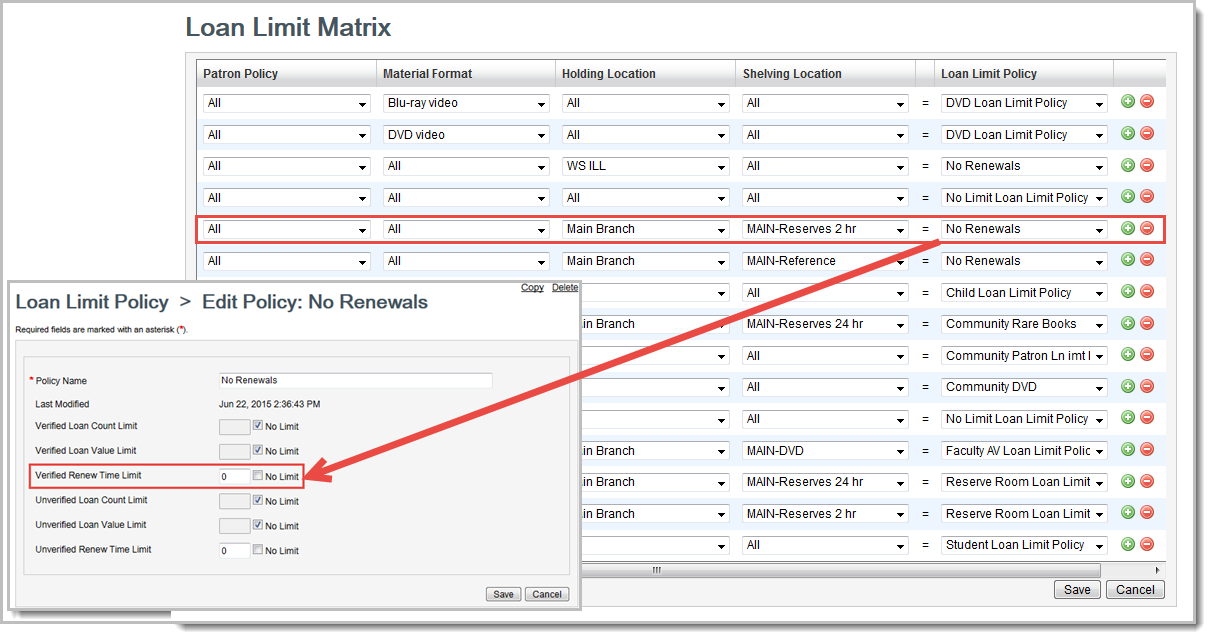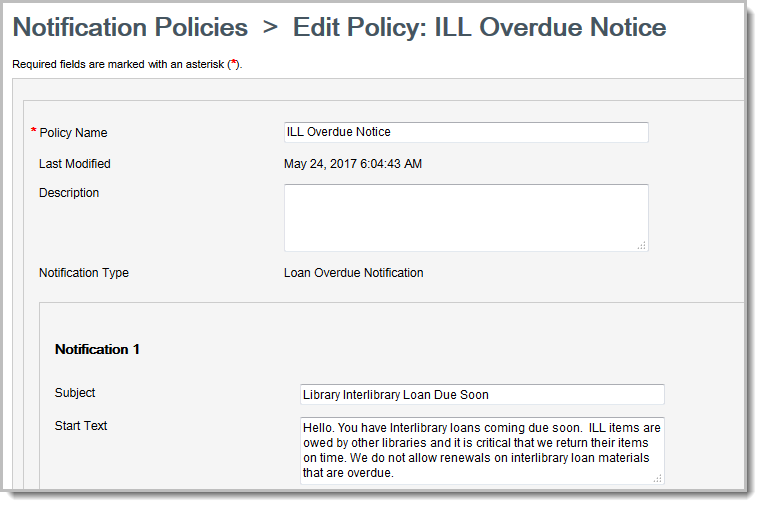Policy Considerations
Use your circulation policies to better manage ILL requests and communicate with your patrons. Circulation policies are set in the WMS Circulation module in OCLC Service Configuration.
Loan Limits (Loan Limit Policy and Loan Limit Matrix)
ILL renewal requests need to be processed through Tipasa. You should consider limiting patrons from renewing items they have on loan via ILL. If you limit patron ILL renewals, you can allow staff to override a renewal after receiving a new date from the ILL department. See Circulation Account roles, Overrides for more information.
In the Loan Limit Matrix, the most restrictive limits that match Patron, Material Format, and Location will be applied to the circulation transaction.

To prevent patrons from being able to renew items in WorldCat Discovery, set the Maximum number of renewals per loan to zero (0). If you would like to allow patrons to renew their ILL materials themselves, it is recommended that they use My Account to do so.
If you have enabled the renew button in My Account, patrons will be able to renew loan items after they have checked the item out. Tipasa renewals will not automatically be reflected in WorldShare Circulation.
Loan Policies (Loan Policy)
You should consider creating a Loan Policy for ILL items if you want different loan and renewal periods, bills, notifications, and recalls.
Loan periods:
- Lending: The due date in Circulation will reflect the due date specified in Tipasa.
- Borrowing: The system will honor the more restrictive (earliest) due date when comparing the ILL lender’s due date and the loan period specified in the Loan Policy. If you have configured a number of days to offset a patron's due date, this will be reflected in the item due date in WorldShare Circulation.
Note: The Due date will revert to the more restrictive of either the Circulation Policy or the due date of the ILL request.
Bills: Your overdue fines for ILL items may be calculated differently. For example, you may have higher overdue fines as an added incentive to get materials returned on time so that you can get them back to the lending institution. Overdue notifications should mention the item in question is an ILL item.
Recalls: Since the lending institution has the right to recall the item at any time, it is a good idea to include a Recall Notification and expect any recalls to be immediately returned.
- To initiate a recall, create another hold in Circulation and select Recall. Borrowing staff can also create a hold for a generic staff account in order to initiate a recall as well.
Notifications (Notification Policy)
You should consider creating notification policies for ILL items if you want different messaging to go out to patrons when their ILL items are due.
Here is an example of a notification. If you want to add additional notifications, see the Notification 2 and Notification 3, etc. areas.

This sample Loan Overdue Notification stresses the importance of returning materials shared through ILL. It also reiterates that you cannot renew ILL items.
You can also configure Notifications to be sent from Tipasa. Please see Notification types for additional information about the types of notification you may want to configure, whether borrowing or lending.
Hold Fulfillment Policy and Map
The Hold Fulfillment Policy determines how long holds remain on the hold shelf waiting for pickup.
The notifications sent as part of the Hold Fulfillment Policy include the notice sent to patrons when the item has been checked in by Circulation staff and is ready for pickup (Hold Pickup Notification Policy) and the notification sent to patrons who failed to pick up their items (Hold Shelf Expiration Notification Policy).
This table illustrates when hold notifications are sent:
| Situation | Hold policy and notification policy applied | Considerations |
|---|---|---|
| Hold request is fulfilled (the ILL item has been received from the lender and is checked in by Circulation staff) |
Hold Fulfillment Policy
|
|
| The patron fails to pick up the ILL item |
Hold Fulfillment Policy
|
Hold Pickup Locations Map
Tipasa integration allows libraries to choose Registry branches as pickup locations. If no pickup location is selected in the request or the pickup location in the request is not a WMS branch, then Circulation’s hold request will default to using the patron’s home branch as the pickup location.
Ensure that holds created by Tipasa have valid pickup locations by including a row in the Hold Pickup Locations Map where the Holding Location is the WS ILL location, Shelving Location is set to All, and all patron home branches are represented in the Default Pickup Locations and/or Alternatives Pickup Locations.
Final tips and reminders
Think about how to take advantage of the benefits of WorldShare Interlibrary Loan and WorldShare Circulation when considering how to best integrate the modules.
- The ILL Request ID is a unique number which can serve as the temporary item barcode when marking the item as received from the lender. This creates an easy connection between the system if you need to research the request and its circulation in more detail (including archived requests).
- Weigh general hold policies with your ILL policies. Consider how you can best balance policies so there will be fewer exceptions during the integration process.
- Encourage patrons to check ILL Requests in My Account. When the item is received, users can check their My Account in WorldCat Discovery or a Circulation notification to know when their item is at the pickup location.
